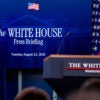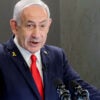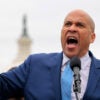The World Tribune’s Gregory Copley has broken the news that “U.S. powerlessness and EU confusion” have opened a “window of opportunity” for Turkey to seriously consider acquiring nuclear weapons. Just last month, Turkey defied its traditional allies, including the United States and Israel, by voting against a fourth round of U.N. sanctions against Iran, in punishments for Tehran’s continued pursuit of nuclear weapons. Further, Turkey’s ruling Justice and Development Party (AKP) has displayed growing Islamist sympathies and exercises an undemocratic stranglehold on power, raising legitimate questions about Turkey’s commitment to secular democracy as well as to NATO.
The news that Turkey is considering “going nuclear” is a game changer, and it should shake the Obama Administration to its core. A nuclear-armed Turkey would ride a coach-and-horses through Obama’s chief foreign policy goal of “getting to zero,” and it would expose his profoundly foolish strategy of neglecting traditional allies in order to engage America’s enemies. It would legitimize Iran’s illicit pursuit of nuclear weapons, and it would so profoundly change the balance of power in the Middle East that the ramifications could not be predicted with certainty for decades.
The Daily Signal depends on the support of readers like you. Donate now
U.S. Secretary of Defense Robert Gates recently stated that Turkey’s strategic drift away from the West is due in part to the European Union’s reluctance to grant Turkey full EU membership. Certainly the EU is not negotiating with Ankara in good faith, but Brussels cannot be entirely to blame. Ankara has distanced itself from Europe and the U.S. and has instead prioritized its relations with Russia and the Muslim world, especially Iran.
Turkey’s formerly close relations with Israel have deteriorated steadily since the AKP’s rise to power, and Prime Minister Recep Tayyip Erdo?an has demonstrated that he is willing to exploit anti-Israeli sentiments to boost his own political popularity. On its current trajectory, Turkey’s traditional strategic relationship with the West will devolve into a looser affiliation, while Ankara simultaneously enters into a closer alliance with Iran and other Middle Eastern powers hostile to U.S. leadership.
Much of this is entirely predictable. President Obama’s policies—namely, his commitment to eradicating nuclear weapons per se, the uncertainty surrounding the future of tactical nuclear weapons in Europe, and his water-treading missile defense program—have raised significant doubt in Turkey’s mind about the reliability of the half-century-old U.S./NATO nuclear and defense umbrella.
President Obama and NATO should not stand idly by and watch this happen. The destabilization brought to the European continent from a premature removal of American nuclear weapons, or an unacceptable degradation of its force, would be a major setback for global security and stability. America should stand behind its nuclear guarantee to Europe and adopt a protect-and-defend strategy that includes robust missile defenses.
Washington should also make clear to Turkey that Ankara’s acquirement of nuclear weapons will not be tolerated and would cost it both its strategic relationship with the U.S. and potentially its membership of NATO.
In 2006, now-Assistant Secretary of State for European Affairs Philip Gordon said the U.S. would soon have to ask itself, “Who lost Turkey?” Unless he wants the answer to be “President Obama,” the Administration should address this issue as a matter of urgency.





























